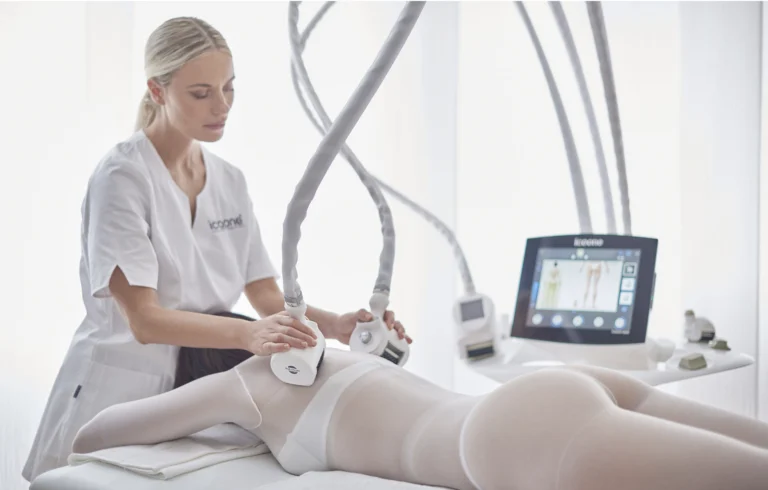When I was young(er), the phrase ‘ageing gracefully’ generally meant someone would age without doing anything to slow the process, however they were blessed with good genes, so even as they aged they still looked good. At the time, ageing was more about the chinks and the dings on the outside, not what was happening on the inside.
Today, ageing is a ‘full body’ proposition. With the ultimate goal of maintaining good health of the mind, body and soul until your last breath. 60 has become the new 40, and with negative stigma removed, people are turning to science to slow the hands of time.
The Low Down
As you age the body’s cycling of cells starts to slow down meaning muscles start to naturally waste, bone density reduces, cognitive functionality slows, and those niggling injuries start to appear more often. After the age of 30, ageing starts to take control and rapidly increases as the years stack-up, marking the shortening of your healthy lifespan.
However, this doesn’t mean we need to give into our body’s degenerative process. With a combination of modern science and age-old practices such as meditation, cold therapy or fasting, you can short-circuit the process. Or as the modern antiager calls it – Biohacking!
Human optimisation, also referred to as biohacking, sees the body as a system and improves the whole system for optimal wellness. Let me make this clear, while biohacking might be a new(ish) word, the practice of changing our body’s biology for optimal health has been going on for centuries! And a lot of the modern techniques, have simply fast-tracked ancient wisdom. For example, Cryotherapy evolved from Hippocrates using immense cold to treat swelling and pain in 400 BC. And in 1050 AD, Anglo-Saxon monks used cold as a local anaesthetic. Today, Cryotherapy allows us exposure to extreme low temps to improve our circulation, reduce cellular inflammation and boost our Lymphatic system.
Interestingly, biohacking can involve taking certain supplements. Nicotinamide is one of the best supplements for anti-aging, thanks to its ability to boost the call’s mitochondrial activity. The mitochondria is the energy centre of the cells in our body and responsible for generating the fuel our body needs to function.
Nicotinamide is more or less Vitamin B, and not only boost mitochondrial activity, it protects our organs, such as the brain, from toxins. It also increases the amounts of NADH and NAD in your body. NAD is an essential compound that helps you maintain a healthy sleep-wake cycle, repair damaged DNA, and protect your body’s cells. All these are good for that younger body or that all important biological age!

Biological Age
Chronological age is the number of years you have been alive i.e your age! Biological age is referred to as physiological age your body functions at and takes many lifestyle factors into consideration, including diet, exercise, stress and sleeping habits. Even though two people may both be thirty years old one of them could have a biological profile that is closer to twenty-five, whereas the other might have a biological profile of thirty-five.
We know biological age is associated with a risk of developing different diseases and even early mortality. There’s good evidence that aging is the number one risk factor for most of the diseases that people suffer such as Alzheimer’s, heart disease, diabetes, and cancer.
According to Morgan Levine, PhD, assistant professor of pathology at Yale School of Medicine who studies ageing, “The longevity and aging field is still fairly new, so we don’t know specifically what things are the most ideal, and these things may also differ from person to person. In animals, we know that things like caloric restriction, fasting, certain drugs or supplements, and genetic manipulations can increase longevity.”

Inflammation
We also know that at a cellular level, inflammation also fast tracks ageing. Many diseases and chronic illnesses stem from this systematic inflammation. Over time chronic inflammation wears out the immune system and can show up in a myriad of diseases and symptoms. Chronic inflammation destroys an otherwise beautiful technology – the way your body functions. Most of us are suffering from inflammation yet may have no idea how to eliminate or reduce. The majority of inflammatory diseases can be reduced through diet and lifestyle. Poor daily lifestyle choices are the root cause of chronic inflammation. Inflammation causes ageing, ageing leads to disease – most notably heart disease, cancer, Type II diabetes and Alzheimer’s.
Breaking the Cycle to Slow the Biological Clock
OK, a little bit to unpack so let me recap real quick. Ageing is inevitable and as we age, a lot of our body functions slow down. Our lifestyle can severely impact our biological age. Poor lifestyle choices lead to internal cellular inflammation further exacabating the effects ageing has on our body. There is a lot we can do to slow the hands of time, including eating well, exercising, keeping our mind sharp, getting enough sleep and reducing stress.
Over and above this we can use simple or advanced biohacking techniques to optimise our health. Supplementation with researched ingredients is without a doubt one of the simplest was you can biohack your body’s functions. This coupled with controlled breathing through meditation will improve your cognitive function, circulation, sleep and clarity. Both of these simple strategies should play a role in your longevity from here on in.
Supplements
Supplements play a vital role in maintaining optimal health. Even if you have a nutrient dense diet, as your body ages (as we have discussed) your body needs more nutrition than you can possibly get from food. Not to mention our body’s ability to create the necessary compounds from these foods has diminished. If that is not reason enough, it is likely your appetite declines as you age, further reducing the amount of food you eat, and thus the amount of nutrients your body receives!
So, what supplements do I need?
There is not a straight-forward answer to this question. Every body is different with different needs. However, if you look at the big killers in the western world, heart disease and cancer, you would be on a safe bet if you took supplements that protected your heart and mopped up toxins.

Antioxidants
The body can cope with some free radicals (toxins) and needs them to function effectively. However, the damage caused by an overload of free radicals over time may become irreversible and lead to certain diseases (including heart and liver disease) and some cancers (such as oral, oesophageal, stomach and bowel cancers). Oxidation (or toxin production) can be accelerated by stress, cigarette smoking, alcohol, sunlight, pollution and other factors.
Antioxidants are substances that can prevent or slow damage to cells caused by free radicals, unstable molecules that the body produces as a reaction to environmental and other pressures.
They are sometimes called “free-radical scavengers.”
Antioxidants are either:
Exogenous – obtained from our diet or supplements, including Vitamins A, C and E
Endogenous – made within our body
Exogenous antioxidants are compounds (phytochemical) found in brightly-coloured fruits and vegetables. We have known for some time that these play an important role in protecting the body. However, little is spoken of the critical role played by endogenous antioxidants, which are also potent in preventing free radical damage, which leads to cellular inflammation, ageing and disease!
The five key endogenous antioxidants are:
- Superoxide Dismutase (SOD), which plays a critical role in neutralising the most potent free radicals
- Catalase
- Glutathione Peroxidase (Gpx)
- Alpha Lipoic Acid (ALA)
- Coenzyme Q10 (CoQ10)
Research has found that boosting cellular levels of endogenous antioxidants with supplements can help stave off age-related diseases, including cancer, heart disease, diabetes and Alzheimer’s.
There are hundreds of scientific studies have found that Bioactive Polysaccharides (enzymes) increase our body’s production of the these important endogenous antioxidants.

CoQ10
You may have heard about many health benefits of coenzyme Q10 (CoQ10). It is an extremely potent antioxidant that can take almost any supplement regimen to the next level. However, if you go to a store to buy some, you’ll see varieties of CoQ10 with a significant range in prices, making the buying process confusing. What’s the deal?
Aside from the variations in dosage and number of servings per bottle, there can be some key differences between CoQ10 products. Here’s what to look out for. CoQ10 is a potent antioxidant that plays a role in many pathways in the body, most notably the energy-producing pathway in mitochondria (also known as the powerhouses of your cells). CoQ10 is well-known for its ability to support heart health, however there is a plethora of research supporting its ability to protect virtually all aspects of health, including brain function as well as overall longevity and well-being.
CoQ10 is naturally produced by the body, but production declines with age. CoQ10 levels are also depleted by taking statin medications for cholesterol, making it even more important for statin takers to take it. In fact, CoQ10 has been shown to mitigate some of the undesirable side effects of statin medications.

The Best Form Of CoQ10
You do need to know that not all CoQ10 supplements are created equal. There are two forms:
- Ubiquinol
- Ubiquinone
Both ubiquinol and ubiquinone are true forms of CoQ10. However, ubiquinone is the oxidised form, which is converted into the reduced form called ubiquinol in the body. Ubiquinone is fat-soluble and not very absorbable on its own. On the other hand, ubiquinol is water-soluble, and therefore is much more easily absorbed into the bloodstream. Ubiquinol is up to eight times more absorbable than ubiquinone and has shown to be more effective for managing health issues such as heart failure and fibromyalgia.
On top of its superior absorption, some ubiquinol products are combined with other ingredients, which even further increases the efficiency of energy production. The form of CoQ10 that’s best to take is ubiquinol. The most common dose for healthy individuals is 100 mg, while smokers and/or statin takers should have around 200-400 mg per day. Ubiquinol is the superior form of CoQ10, so check the supplement facts label on the product to ensure you know what form you’re getting.
New Era of Supplements
No longer do we have five or six supplement bottles stacked up on the kitchen bench for our daily ritual in the quest for ever lasting health. Today, clever formulators create products that have synergistic ingredients that are better together than they are apart! This not only gives you more value for money, it also means you don’t have to take as many supplements.
One of the newest supplements available, L1FE CirQul8, ticks all the anti-aging boxes and has a high dose of ubiquinol. It also contains, Nicotinamide and other wonderful antioxidants, with a small dose of zinc. So while it supports heart health, it has other benefits for your immune system and energy production.
If you would like to learn more about this supplement visit Jeunesse.

In the words of Pablo Picasso, Youth has no age!
Written by Kris Abbey
With all nutritional information, it is advised you see your health care professional, especially if you have underlying medical conditions and taking medication.




